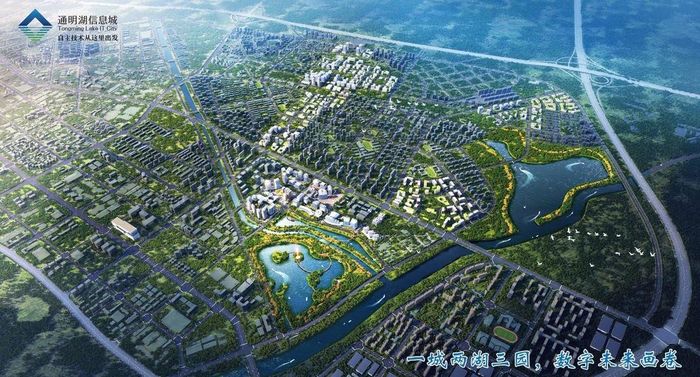UnioTech claims to break Windows monopoly in China's campaign for technological self-reliance
At Tongming Lake IT City, a high-tech industrial park in the Yizhuang economic zone south of Beijing, China's efforts to eliminate core technology from abroad are on full display in a wide area. more than 500 football fields.
Since development began in 2019, Tongming Lake IT City is now home to the headquarters of several famous Chinese technology firms. Among them are chip design firms Loongson Technology and Sophgo Technologies; server and cloud computing provider Inspur Group; Huawei's Kunpeng big data solutions unit; cybersecurity solutions startup KML Technology Group; The company specializes in developing the UnioTech Software operating system.
During a media tour organized by the Beijing government last week, Tian Ye (manager at UnioTech Software) told visitors that the company's products were "breaking the monopoly of the system". operating Windows".
UnioTech Software, a company founded from China's community of Linux enthusiasts, is leading domestic efforts to replace foreign operating systems on personal computers (PCs) and servers. UnioTech Software's Linux-based PC operating system is becoming increasingly popular with governments as it offers alternatives to Windows (created by Microsoft).
China's effort to phase out foreign systems in its military and state agencies has been going on for years and accelerated with the government-led Xinchuang campaign, which aims to develop local solutions. method to replace foreign chips, systems, databases and software. China also aims to build its domestic technology sector into one with a total annual output of 100 billion yuan ($13.9 billion) by 2025.
Despite those efforts, analysts say China faces major hurdles in the semiconductor sector.
Dan Hutcheson, Vice President of semiconductor industry research company TechInsights (Canada), said in an online seminar that China is about 10 to 15 years behind the West in lithography technology (a key step in manufacturing). chip) even though the gap in processing techniques is smaller.
Russell Wu, CEO of network equipment startup TML (who used to work for Intel), said China is far behind foreign competitors in product quality and precision in chip manufacturing, but the country This Asia will strive to be self-sufficient if necessary.
'We choose to cooperate whenever possible, but if we can't, we go our separate ways. It may be slower but we won't die,' said Russell Wu.
He added that the Xinchuang campaign offers an opportunity to create China's own ecosystem so that domestic startups can rely on each other and grow together.
UnioTech Software's operating system has been configured to work with most processors manufactured by major Chinese CPU (central processing unit) companies and brands, including Huawei, Hygon Information Technology, Phytium Technology , Loongson, Zhaoxin Semiconductor and Sunway.
Most of these companies have been blacklisted by the US Department of Commerce, meaning they cannot use contract chip manufacturing services in many parts of the world. As a result, they have to depend on Chinese chip manufacturers to create their CPUs.
UnioTech Software said that as of last year, its operating system was installed on more than 6 million computers domestically in China, with 40,000 customers being organizations such as government agencies, financial institutions and companies. government.
In March, the Chinese government announced it would increase spending on science and technology development by 10% in 2024 to about 370.8 billion yuan. The additional financial support comes even though China's economy is sluggish, with the real estate market in recession.
Some foreign businesses operating in China have felt the heat from efforts to switch to domestic alternatives.
VMware, the cloud computing company recently acquired by chip giant Broadcom (US), cut the size of its sales team in China last year, partly because state-owned companies shunned services. their database, according to the SCMP site.
SCMP said VMware has faced increasing competition from Huawei and other Chinese companies offering similar solutions.
VMware did not immediately respond to a question on this topic from SCMP.
Cameron Johnson, a supply chain expert in Shanghai (China), said: 'This is nothing new and China's drive to replace foreign technology has been going on for two decades. American companies in China are aware of the country's motivation to favor domestic IT vendors. That's at odds with China trying to convince the rest of the world that it's open for business.'

On April 12, the Wall Street Journal reported that the Chinese government has required major telecommunications carriers to replace foreign chips in their core networks by 2027.
The industry watchdog ordered the country's three largest state-owned mobile carriers, China Mobile, China Unicom and China Telecom, to inspect their networks and set timelines for replacing processors. The reason is not from China.
China Mobile, China Unicom and China Telecom are among the country's largest cloud and data center providers, using chips from the American company.
According to the Wall Street Journal, China's Ministry of Industry and Information Technology issued this directive earlier this year, which could affect American chip manufacturers such as Intel and AMD.
The above telecommunications directive is similar to the move of Western governments to ban the use of Huawei network equipment because they consider it a threat to national security.
China is accelerating its campaign to eliminate American technology, in part to avoid growing sanctions from the Biden administration. The Chinese government has directed state-backed agencies and corporations to stop using iPhones, pushed companies to abandon foreign computers and required its electric car makers to use chips designed domestic plan.
This broad, coordinated effort accelerated in 2023 with the rise of leading national technology firms such as Huawei and SMIC (China's No. 1 chipmaker). This raises the prospect of domestic alternatives across the entire technology supply chain.